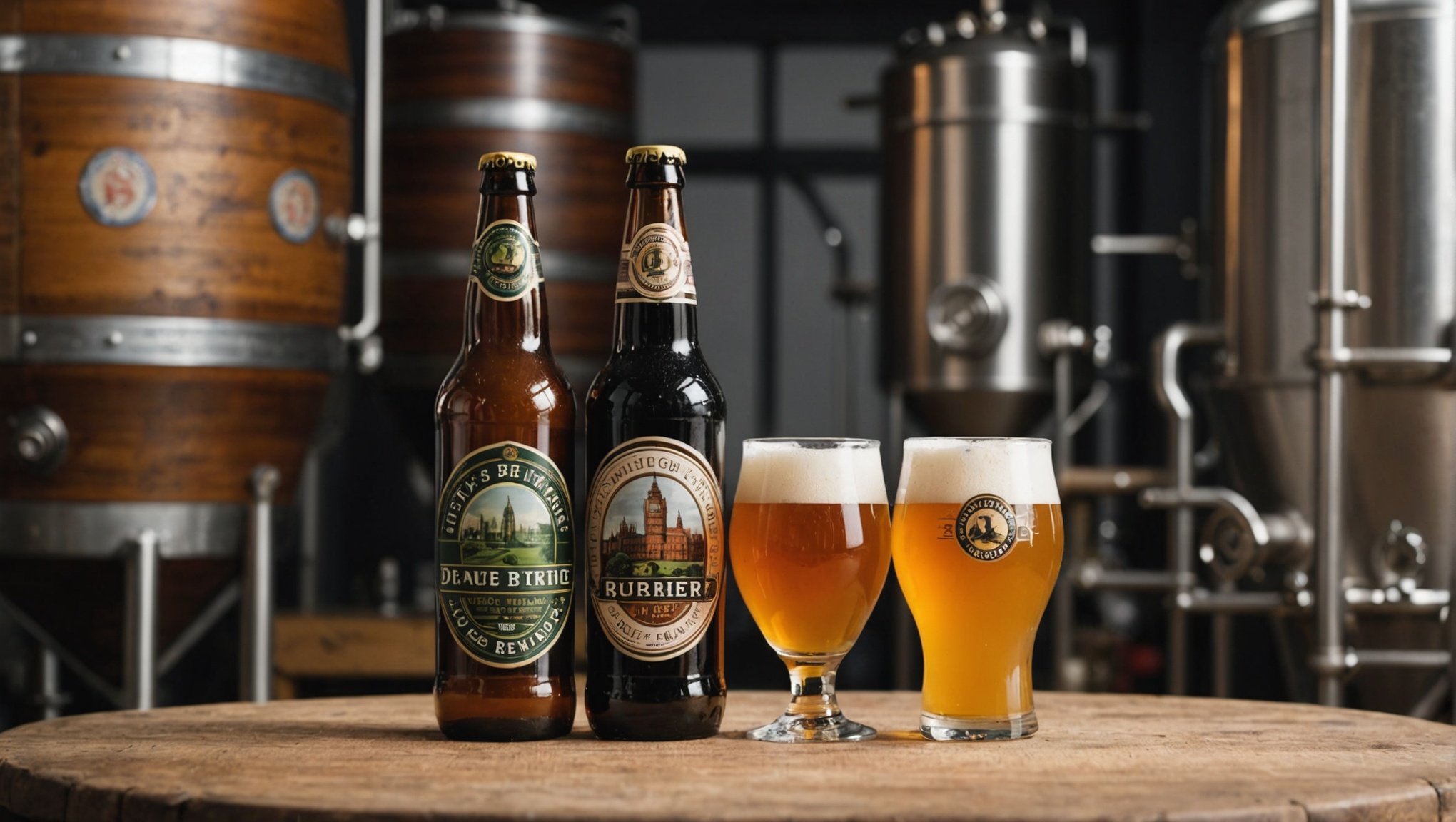Local ingredients redefine UK breweries, infusing unique flavors that reflect the region's rich heritage. By harnessing the bounty of British farms, breweries craft distinctive beers that tell a story of local landscapes and traditions. This approach not only delights consumers seeking authenticity but also fosters sustainability and community support. Discover how embracing local ingredients creates a competitive edge for breweries, transforming them into true ambassadors of British taste.
The Importance of Local Sourcing in Brewing
In the world of craft beer, the use of local ingredients plays a crucial role in defining unique flavor profiles. Brewers who source locally can experiment with fresh, seasonal ingredients, leading to innovative and distinct tastes that reflect the region's terroir. This not only enhances the regional identity of their brews but also sets them apart in a competitive market.
In parallel : Unlocking Visitor Engagement: The Power of Podcasts in UK Museums
Local sourcing extends beyond just flavor; it fosters a deep connection between breweries and their communities. By choosing local ingredients, brewers support local farmers and suppliers, contributing to the local economy. This collaboration strengthens community ties and creates a shared sense of pride in the final product.
Moreover, incorporating local ingredients in brewing helps to craft a narrative around the beer, making it a symbol of regional identity. Each brew tells a story of its origin, offering consumers a taste of the local culture and environment. This connection can be particularly appealing to consumers seeking authenticity and a sense of place in their craft beer choices.
Also to discover : Unlocking Client Attraction: Effective Content Marketing Strategies for UK Freelancers
In essence, local sourcing in brewing is not just about the ingredients; it's about creating a meaningful connection between the beer, its origin, and the community that supports it.
Strategies for Sourcing Local Ingredients
Ingredient sourcing is pivotal for breweries aiming to craft unique and authentic beers. One effective strategy is building strong partnerships with local farms. This not only ensures a steady supply of fresh ingredients but also fosters trust and mutual support. By collaborating closely with local farmers, breweries can gain access to exclusive or limited-availability produce, which can set their offerings apart.
The seasonal availability of ingredients significantly influences the selection process. Brewers must be adaptable, aligning their production schedules with the harvest cycles of local farms. This approach allows them to incorporate the freshest ingredients, enhancing the beer's flavour profile and authenticity. It also encourages creativity, as brewers experiment with what is seasonally available, leading to innovative and distinctive brews.
To navigate the challenges of local sourcing, breweries can employ innovative sourcing strategies. These might include forming co-operatives with other local businesses to share resources and costs, or investing in technology to improve supply chain efficiency. By doing so, breweries can maintain a robust inventory of local ingredients, further strengthening their connection to the community and their commitment to sustainability.
Successful UK Breweries Leveraging Local Ingredients
In the vibrant landscape of UK breweries, several stand out for their adept use of local ingredients. These breweries have mastered the art of creating distinct, local flavors that resonate with consumers. By focusing on case studies of these successful breweries, we can uncover the secrets behind their unique offerings.
One such example is the renowned Thornbridge Brewery, which has gained acclaim for its innovative use of locally sourced hops and barley. By integrating these ingredients, they craft beers with a flavour profile that captures the essence of their region. This not only enhances the taste but also strengthens their brand's connection to the local community.
Another noteworthy brewery is Adnams, which prides itself on sustainability and local sourcing. Their commitment to using local ingredients results in beers that tell a story of their origin. The narrative behind each brew is a powerful tool in promoting their products, as it offers consumers a taste of authenticity and regional pride.
These case studies illustrate how UK breweries are leveraging local sourcing to create unique flavors. By intertwining storytelling with their brewing processes, these establishments effectively promote their local brews, captivating the hearts and palates of beer enthusiasts.
Terroir’s Influence on Brewing
Understanding terroir is essential in appreciating the unique characteristics that local geography imparts to brewing. In the context of brewing, terroir refers to how the environment—soil, climate, and topography—affects the flavor characteristics of ingredients like hops and barley. This concept is significant because it allows brewers to create beers that reflect their region's distinctive traits.
Local geography plays a crucial role in shaping ingredient characteristics. For instance, the mineral content of the soil can influence the taste of barley, while climate conditions impact the growth cycle and aroma of hops. These regional differences result in diverse flavor profiles, making each beer a testament to its origin.
In the UK, several breweries have harnessed the power of terroir to craft unique beers. For example, the mineral-rich soil of Kent contributes to hops with a distinct bitterness, while the maritime climate of Cornwall imparts a subtle salinity to its brews. These terroir-driven flavors not only enhance the taste but also provide a narrative that connects the beer to its geographical roots, offering consumers a genuine taste of the region.
Recipes Featuring Local Ingredients
Crafting beers with local ingredients involves more than just sourcing; it requires innovative techniques to truly highlight regional flavors. Brewers can create unique brewing recipes by incorporating ingredients that embody their local environment. For example, a recipe might feature hops from Kent, known for their distinctive bitterness, or barley grown in mineral-rich soils, adding depth to the brew.
When integrating local flavors, brewers often employ techniques such as dry-hopping, which enhances aroma without overpowering the beer. Another method is barrel-aging, which allows the beer to absorb subtle notes from the wood, complementing the regional ingredients used.
Adapting to seasonal ingredients is another exciting challenge. Brewers can adjust recipes to align with the harvest schedule, ensuring the freshest components are used. For instance, a summer brew might include freshly picked berries, while an autumn ale could feature locally grown pumpkins.
These techniques not only enhance the beer's taste but also allow brewers to tell a story through their creations. By focusing on local ingredients and innovative methods, breweries can develop distinctive recipes that resonate with their community and celebrate their regional identity.
Marketing Benefits of Emphasizing Local Sourcing
Emphasizing local sourcing in brewing can significantly enhance a brewery's brand image. By integrating local branding into marketing strategies, breweries can position themselves as authentic and community-focused. This approach resonates well with consumers who value sustainability and locality, aligning with current consumer trends.
Incorporating local ingredients into brewing not only improves the product's story but also strengthens the brewery's connection with its audience. Consumers are increasingly drawn to products that reflect a commitment to the environment and community. Highlighting these aspects in marketing campaigns can create a strong emotional bond with consumers, encouraging brand loyalty.
Marketing strategies that focus on local sourcing can include storytelling elements that showcase the journey of ingredients from farm to brew. This narrative not only educates consumers but also differentiates the brand in a crowded market. Breweries can also engage in community events and collaborations with local businesses, further solidifying their local presence.
Effective marketing campaigns might feature:
- Showcasing the unique flavors derived from local ingredients.
- Sharing stories of local farmers and suppliers involved in the process.
- Highlighting the environmental benefits of reduced transportation and support for local economies.
These strategies can effectively communicate the value of local sourcing, enhancing brand perception and driving consumer engagement.
Trends in the Craft Beer Industry
The craft beer industry is undergoing a dynamic transformation, driven by evolving consumer preferences and innovative brewing practices. Among the most influential craft beer trends is the growing emphasis on sustainability. Brewers are increasingly adopting eco-friendly practices, from sourcing renewable energy to utilising recyclable packaging. This shift not only reduces environmental impact but also aligns with consumer values, enhancing brand loyalty.
Another significant trend is the emphasis on locality. Craft breweries are leveraging their local roots to differentiate themselves in a saturated market. By highlighting local ingredients and community connections, they create a unique selling proposition that resonates with consumers seeking authenticity. This focus on locality not only strengthens community ties but also offers a competitive advantage, as consumers are more inclined to support local businesses.
Moreover, the integration of sustainability and locality in brewing practices reflects broader societal shifts towards environmental consciousness and community engagement. As these trends continue to evolve, craft breweries that embrace them are likely to thrive, capturing the hearts of environmentally and socially conscious consumers. By staying attuned to these trends, breweries can maintain relevance and foster a loyal customer base.
Challenges of Sourcing Local Ingredients
Sourcing local ingredients presents unique sourcing challenges for breweries, particularly when it comes to maintaining a consistent supply chain. One major difficulty is the seasonal changes that affect ingredient availability. Local farms operate on natural cycles, meaning certain ingredients are only available at specific times of the year. This can lead to fluctuations in supply and requires breweries to adapt their production schedules accordingly.
Another challenge is ensuring quality control. Local ingredients can vary significantly in quality due to factors such as weather conditions and soil quality. Brewers must implement rigorous quality control measures to ensure that each batch meets their standards. This might involve establishing close relationships with farmers to monitor growing conditions and selecting only the best produce for brewing.
Moreover, the logistics of sourcing from multiple local suppliers can complicate the supply chain. Coordinating deliveries and managing inventory from various sources demands efficient planning and communication. Despite these challenges, the benefits of local sourcing—such as enhanced flavor profiles and community support—often outweigh the difficulties, making it a worthwhile endeavor for breweries committed to authenticity and sustainability.
Community Engagement through Local Brewing
Community engagement is a cornerstone for breweries aiming to build lasting relationships with their local audience. By actively participating in local events and festivals, breweries can showcase their commitment to the community, strengthening their brand presence and fostering loyalty among consumers.
Collaborations with local events not only provide exposure but also offer a platform for breweries to introduce their unique offerings to a broader audience. Participating in these events allows breweries to engage directly with customers, receiving immediate feedback and building personal connections. This interaction can be invaluable in understanding consumer preferences and adjusting offerings accordingly.
Brewery collaborations with local businesses and artisans can further enhance community ties. By working together, they can create exclusive products or events that highlight regional flavors and craftsmanship. These collaborations can take many forms, from co-hosting tastings to developing limited-edition brews that celebrate local culture.
Building a loyal customer base through local ties requires consistent and genuine engagement. Breweries that invest in their communities often see returns in the form of customer loyalty and advocacy. By prioritising community involvement, breweries not only enhance their local reputation but also contribute positively to the community's economic and cultural landscape.
Future of Local Ingredients in UK Brewing
The future trends in UK brewing are increasingly leaning towards innovative local sourcing. As consumer preferences shift towards authenticity and sustainability, breweries are expected to deepen their commitment to using local ingredients. This trend is not only about supporting local economies but also about creating unique, region-specific flavours that set craft beers apart.
Craft beer innovation is at the forefront of this movement. Brewers are experimenting with new techniques to maximise the potential of local ingredients, such as using wild yeasts indigenous to specific regions or incorporating unusual local botanicals. These innovations allow breweries to craft distinctive beers that reflect their geographical and cultural roots.
The role of technology is crucial in enhancing local sourcing efforts. Advanced data analytics can help breweries predict ingredient availability and optimise supply chains. Additionally, precision agriculture technologies enable farmers to improve crop yields and quality, directly benefiting breweries. By leveraging these technological advancements, breweries can ensure a consistent supply of high-quality local ingredients, further solidifying their position in the market.
In the coming years, the synergy between future trends, local sourcing, and technological innovation will likely drive the UK brewing industry towards more sustainable and locally-focused practices.
















